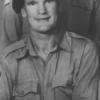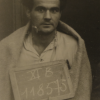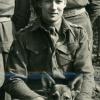Major General Robert Goldsmith, who has died aged 87, was Deputy Chief of Staff, 1st Allied Airborne Army, in the closing stages of the Second World War and Chief of Staff, British troops in Egypt, in the period leading up to the Suez crisis of 1956.
‘Robin’ Goldsmith’s arrival in Egypt in 1951 coincided with Egypt’s abrogation of the 1936 Treaty of Alliance with Britain (and the 1899 Agreement over the Sudan).
It was an eventful year in world politics.
War was raging in Korea; MacArthur was dismissed; there was a military coup d’etat in Syria; King Abdullah of Jordan and the premiers of Iran and Pakistan were assassinated; Burgess and Maclean fled to Russia; and the Conservatives were returned to power with Winston Churchill as Prime Minister and Anthony Eden as Foreign Secretary. The Egyptians tried – ‘not very effectively’, as Goldsmith put it – to deny Britain the use of her base in the Canal Zone. It was, Goldsmith later noted, ‘the most interesting portion of my service’.
In retirement from the Army he edited the Army Quarterly with great success for seven years from 1966. Son of Colonel HD Goldsmith, Robert Frederick Kinglake Goldsmith was born on 21 June 1907 and educated at Wellington and Sandhurst, from which he was commissioned into the Duke of Cornwall’s Light Infantry in 1927.
His military career began with six years in India, where he enjoyed making excursions into the Himalayas; in 1931 he made a six-week trek from Kashmir into Ladakh and Baltistan. In 1935 Goldsmith returned to the Regimental Depot at Bodmin, and two years later attended the Staff College, Camberley.
He was then seconded to the RAF as an intelligence staff officer: first at Norwich, then at Huntingdon and then – when the new Army Co-operation Command was formed in 1940 – at Bracknell. The winter of 1941-42 saw him back with the DCLI (6th Battalion) on anti-invasion duty on the East Coast; he then had a stint with the Airborne Division (near Salisbury), planning the development of airborne forces. But in late 1942, when the 4th DCLI needed a new CO, Goldsmith was appointed to lead it.
He was recalled to the 1st Airborne Division in 1943, to prepare for the invasion of Southern Europe. In Algeria Goldsmith worked with the Americans. There were not enough aircraft for the division to operate as a whole, so the glider-borne brigade took part in the initial assault on Sicily, in July 1943.
Goldsmith was given a lift in an American tug aircraft and witnessed much of that disastrous event, when many gliders were cast off too early by inexperienced American pilots and landed in the sea. This was followed a few days later by a parachute drop at Catania.
When Italy capitulated, in September 1943, the 1st Airborne Division was landed by British and American warships at Taranto and fought its way up to Foggia, after which the 8th Army took over. At the beginning of 1944 the 1st Airborne Division was brought back to Britain to make ready for the invasion of the Continent.
The 6th Airborne Division had been in action on ‘D’-Day, but the 1st Airborne was reserved until Arnhem – a catastrophe redeemed only by the courage of the participants. By then Goldsmith had been posted as Deputy Chief of Staff to 1st Allied Airborne Army, a joint Anglo-US formation created in a hurry to take charge of airborne operations on the ground and in the air.
After the war he became the instructor at the Joint Services Staff College at Latimer, before himself becoming a student at the Imperial Defence College. On completion of the course he was appointed commander of 131 Infantry Brigade (TA) from 1950 to 1951, before being posted to Egypt.
On his return to Britain in 1954 Goldsmith served on the staff in the War Office and then (as a Major General) was Chief of Staff at Western Command in Chester from 1956 to 1959. During this period he took the Passing Out Parade at Eton Hall OCTU, in which his own son was among the newly commissioned officers. When he was making the final address a clock chimed throughout. Undeterred, he shouted “I’m waiting for the clock to stop” and then completed his speech.
Goldsmith’s last appointment was GOC Yorkshire District, from 1959 to 1962, during which time he supervised the transformation of Catterick, which had been renowned for its austerity, into a place which ‘a soldier could regard as a home’.
He was appointed Colonel of the DCLI from 1958 and then, after its amalgamation with the Somerset Light Infantry, of the Somerset and Cornwall Light Infantry from 1963.
Goldsmith was awarded the American Order of Merit for service with the 1st Allied Airborne Army, appointed a CBE for service with 131 Infantry Brigade and a CB for service in the Canal Zone. He was put forward for the OBE in March 1944 for his work in the Sicilian and Italian campaign’s the year before, but it was not awarded. The citation, endorsed by Maj Gen RE Urquhart, reads:
'This officer has given outstanding service as GSO 1 of the 1st Airborne Division. He assisted in the preparation and launching of the airborne operations in SICILY. He prepared at short notice and took part in landings at TARANTO and the subsequent operations in ITALY. It is largely due to his organising ability and his outstanding work under difficult conditions that such a measure of success was obtained.'
Besides editing the Army Quarterly, in retirement he edited the Winchester Cathedral Records. He wrote a booklet, The Military Memorials of Winchester Cathedral, helped in the library and served as a sidesman.
‘Robin’ Goldsmith was widely read and a devotee of classical music. He was highly practical, too, good with his hands and a more than competent carpenter. Modest and kind, he could always find humour in the grimmest circumstances. Outside his regiment the well meaning used to say of him: “It’s hard to believe he has ever been a soldier at all”.
He took a keen interest in his family: as a boy in England with parents abroad he had often stayed with relations, with whose descendents he kept in close touch. He married, in 1935, Brenda Bartlett, who died in 1983; during their marriage in the service they had 17 different habitations.
They had a son, Alick Goldsmith, formerly of the Diplomatic Service who served as Director-General of the Export Group for the Construction Industries.
Compiled by Bob Hilton
Read More




Latest Comments
There are currently no comments for this content.
Add Comment
In order to add comments you must be registered with ParaData.
If you are currently a ParaData member please login.
If you are not currently a ParaData member but wish to get involved please register.